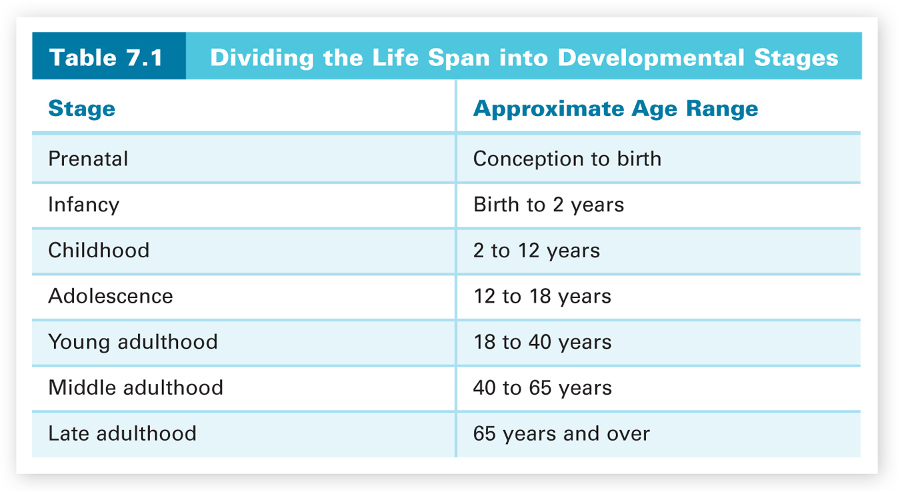
|
|
|---|---|
| 7 | Developmental Psychology |
|
Prenatal Development How We Develop During Infancy
How We Learn Language Piaget’s Theory of Cognitive Development Vygotsky’s Sociocultural Approach to Development How Intelligence Changes in Adulthood
Kohlberg’s Theory of Moral Reasoning Attachment and Parenting Styles Theory of Mind Erikson’s Psychosocial Stage Theory of Development |
So far we have discussed perception, learning, memory, thinking, and intelligence, but we have not considered how these processes develop over the life span. This is what developmental psychologists study—how and why we change as we grow older. They examine our behavior and mental processing from conception until death. Developmental psychology is the scientific study of biological, cognitive, social, and personality development throughout the life span. This chapter will focus on three major types of development—biological, cognitive, and social (the next chapter will deal with personality).
Historically, a major issue for all types of development has been the nature-versus-nurture question (which we also confronted in our discussion of intelligence). As with intelligence, most psychologists now believe that nature and nurture interact to influence our development. Lingering controversial issues include exactly how nature and nurture interact and which is more important to the various aspects of our development (Harris, 1998). We will return to the nature–nurture issue at different points in the chapter.
Developmental psychologists usually divide the life span into several stages, beginning with the prenatal stage and ending with late adulthood. Table 7.1 provides a commonly used set of stages, each of which is characterized by different biological, cognitive, and social changes. Most of the major theories in developmental psychology that we will discuss are stage theories. Stage theories organize developmental change by providing the approximate age ranges at which we can expect certain types of behavior and cognitive functioning. Keep in mind, however, that the age at which individuals enter and leave stages can vary, that stage transition is probably more gradual than abrupt, and that stage definitions may vary across cultures.

This chapter is divided into discussions of different types of development, but it is important to remember that the various types of development occur simultaneously and so have an impact on each other. We begin with a discussion of the first two stages of the life span—prenatal development and infancy—to learn how development begins and progresses very early in our lives. Here we will be mainly concerned with physical development, specifically sensory and motor development. Next we will focus on our cognitive development from birth through adulthood by discussing early language development, Jean Piaget’s influential stage theory of cognitive development, Lev Vygotsky’s sociocultural approach to such development, and the question of whether intelligence declines across the life span.
In the last section of this chapter, we will consider social development. We will begin with a discussion of Lawrence Kohlberg’s influential theory of the development of moral reasoning, then examine early social development with a discussion of the research on attachment formation, parenting styles, and theory of mind development, and conclude with a description of Erik Erikson’s stage theory of social-personality development across the life span. This chapter will give you a better idea about where you are in your development, how you got there, and where you can expect to go.
 PRENATAL DEVELOPMENT AND INFANCY
PRENATAL DEVELOPMENT AND INFANCY